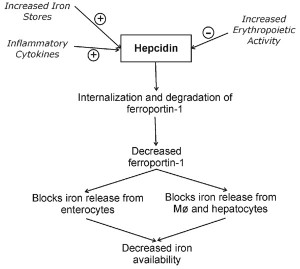Hepcidin, a small protein produced by the liver, is a key regulator of iron and subsequently erythropoiesis. The effect of hepcidin is to decrease iron stores by blocking iron release from enterocytes, macrophages or hepatocytes (by downregulating iron transporters in the membranes of these cells). Hepcidin is thought to be one of the main mediators of the anemia of inflammatory disease.
Hepcidin production is regulated by iron stores, erythropoietic activity and inflammatory cytokines (e.g. tumor necrosis factor-alpha, interleukin-6). Excess iron stores and inflammation will increase hepcidin, resulting in decreased iron availability (from sequestration within body stores in macrophages (M0) and hepatocytes) and, consequently, low iron concentrations in blood. Hepcidin production is inhibited by erythropoiesis, which makes sense because iron is required for hemoglobin production and erythropoiesis. This over-rides the effect of increased iron stores on stimulating hepcidin release but does not over-ride the effect of inflammatory cytokines. Hence, anemia can be the result of inflammation.

